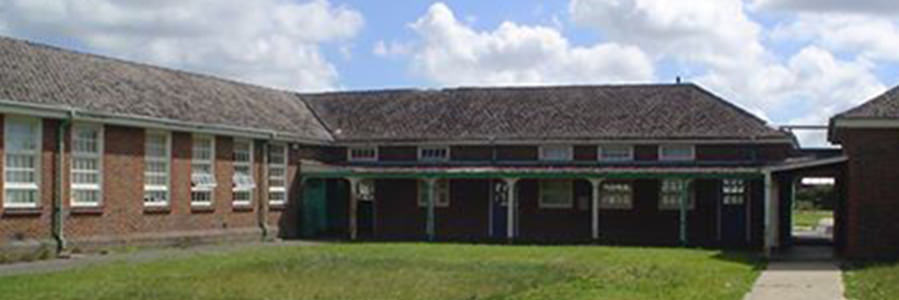I believe the following were evacuated with the school: Messrs Evans, John, Jeremy, Gribble, Lambert, Haill, Bacon, Cossins, Collins, Collings, Cooper, Dix, Cundall, Read, Summerton, Wigley and Bramble.
Mr Morgan was seriously injured in a car accident near Oxford when driving back from holiday in Wales to rejoin the school for the evacuation. He never came back to teach but did visit us in the summer of 1940, when he was able to walk with the aid of a stick. I remember Mr Collings (“Cogs”, to distinguish him from Collins), who taught German, being married in September 1939 whilst we were still in Bognor. I believe he was an Army Reservist and was called up fairly early in the war, presumably for Intelligence and do not remember him at Chichester.
Teaching was a Reserved Occupation (i.e. not called for military service) for teachers over a certain age – probably 30, but perhaps 25 – and so most HTS staff were exempt. Two exceptions were Summerton (Physics) and Wigley (Biology/Music), who were called up in 1940. Summerton became an Instructor-Lieutenant in the Royal Navy and was on the cruiser HMS Manchester when she was torpedoed and sunk in the Mediterranean whilst escorting a convoy to Malta. Along with most of the crew, he was rescued; I understand that after he was demobilised he became a lecturer at a technical college, rather than returning to school teaching.
The last I heard of Mr Wigley (who lodged with the Read family in Chichester) was that he had left for South Africa or Rhodesia to train as a pilot in the RAF. A later entry in the school magazine listed him as P/O Wigley, DFC, so he obviously was successful in that rôle. He was a talented musician and took control of the school orchestra from Stan Read when he joined HTS in 1937.
Mr Wigley took my pal Bob Denby and me into the blacked-out cathedral one winter evening whilst he practised on the organ (with the Bishop’s blessing) – quite a memorable experience for us boys.
Stan Read was also a Home Guard officer. The Chichester Home Guard was a Company, divided into six platoons, each of which was responsible for a geographical area of the city. Mr Read, originally a sergeant, was later commissioned and became CO of no 4 Platoon to the south of Chichester, where he lived. Bob Denby and I were members of no 1, to the north, where we were billeted. Mr Bramble, who had been a serving officer before joining HTS, was the Company Sergeant Major, ie, in charge of all the local Home Guard members of some 450 men. I well remember him drilling us all together in the cattle market in preparation for a War Weapons Week parade, when we would be marching with regular Army, RAF and Royal Navy contingents; he was determined that we would be as smart as them. This was probably in 1941 or 1942, by which time the Home Guard was really quite effective – despite the image portrayed in “Dad’s Army” programmes!
Mr John led a small contingent of staff back to Clapham to re-open the School there.
After the war at least two HTS staff – Messrs Haill and Collins – decided to stay on in Chichester and transferred to the High School for Boys.
Monty Clarkson
Old Thorntonian (1935-1942)

